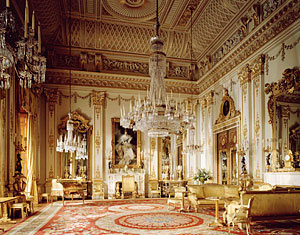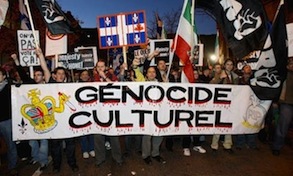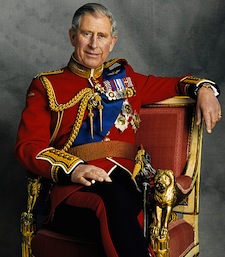Opponents of the Canadian Crown frequently criticize the monarchy without fully being aware of the facts. As well, opponents often deliberately spread misinformation. More often, Canadians are simply just not aware of how their government works. This summary is intended both to correct the record, and to augment an educational system which unfortunately often fails to provide comprehensive knowledge of Canada’s constitution.
We should have a Canadian head of state. The Queen is a nice lady but she’s a foreigner.
Canadians living in a diverse and mobile society rarely properly describe people as foreigners
.
We judge individuals not by the place of their birth, the colour of their skin or their accents, but by their character and their contribution to Canadian society. By this standard our Queen is as Canadian as can be: in her length of service to the country, in her pride in being our Queen and our reciprocal affection for her, in her being the embodiment of citizenship, the source of law and the guardian of the constitution, and in her linking us to the multi-cultural peaceful alliance that is the Commonwealth. When The Queen is not present, a number of our fellow Canadians represent her as Governor General and lieutenant governors.
The monarchy costs the taxpayer way too much. Why should we support The Queen and her family in luxurious palaces? Why should we pay anything towards her expenses and Royal tours to Canada?
Canadians do not give any financial support to The Queen in her roles as Head of the Commonwealth, as Queen of the United Kingdom or as Sovereign of her other Realms. Nor does she receive any salary from the federal government. In this respect, her role as chief volunteer of the Commonwealth is unexcelled.
 As shown in the latest triennial study of the cost of the Canadian Crown, each Canadian contributes about $1.63 a year (a total of a little over $50 million) towards our form of governance. However, the great majority of these costs stem from: a) maintaining the historic buildings (Government Houses) occupied by vice-regal representatives; and b) from honouring Canadians who have performed outstanding acts or given a lifetime of service to the country.
As shown in the latest triennial study of the cost of the Canadian Crown, each Canadian contributes about $1.63 a year (a total of a little over $50 million) towards our form of governance. However, the great majority of these costs stem from: a) maintaining the historic buildings (Government Houses) occupied by vice-regal representatives; and b) from honouring Canadians who have performed outstanding acts or given a lifetime of service to the country.
Whether a republic or monarchy, Canadians would maintain these heritage buildings and recognize achievements through an honours system. A president would likely be more expensive—look at the proportional costs of the White House and Elysée Palace! There may be arguments for a republic, but cost-saving is not one of them.
Canadians pay for The Queen only when, as our head of state, she performs duties in Canada. As was demonstrated in 2010 and during her previous tours, people flock to welcome her, and clearly derive great pleasure from her homecomings. The most recent tour cost Canadians approximately 15 cents per person. Like all countries, Canadians regularly welcome and bear similar or greater expenses for visiting heads of state and government, ranging from the Pope to the Emperor of Japan to the Presidents of the United States and Mexico, none of whom have any constitutional involvement with our land, but whom we welcome as friends, allies or trading partners. How much more, then, should we welcome our own head of state, especially when her lifetime of service to Canada has been undertaken without her receiving one penny of salary?
The Queen is the Supreme Governor of the Church of England and is also officially styledDefender of the Faith. Why? We don’t have a state religion in Canada.
The Queen has no religious role in Canada. However, Canada’s Parliament chose to include the phrase Defender of the Faith
in the monarch’s title in 1953. Though it stems from history, today it can be taken to signify the Crown’s role in protecting freedom of religion. The Queen usually worships at an Anglican Church (except in Scotland where she is a member of the Church of Scotland) just like anyone else who might seek out a mosque, temple or church of their own faith. However, The Queen’s role with the Church of England is only of consequence in Great Britain. In Canada, she plays no role in promoting any religion. However, she has the same constitutionally-guaranteed freedom of religion as any other Canadian. Find more information about the monarchy and religion and the title Defender of the Faith.
If we abolished the monarchy, national unity would be improved.
 The absurdity of this belief is illustrated in the fact that the separatist premier of Québec, Réne Lévesque, joined the nine other premiers in 1978 in acknowledging that any federal state needs at its head a neutral arbiter. Of course it is true that separatists, devoted to destroying the unity of the Canadian state as we know it, logically oppose all the institutions of Government. Canadians would hardly wish to cater to their formula for
The absurdity of this belief is illustrated in the fact that the separatist premier of Québec, Réne Lévesque, joined the nine other premiers in 1978 in acknowledging that any federal state needs at its head a neutral arbiter. Of course it is true that separatists, devoted to destroying the unity of the Canadian state as we know it, logically oppose all the institutions of Government. Canadians would hardly wish to cater to their formula for improving
Canada. Moreover, it is equally fanciful to assume that the millions of devoted monarchists across Canada would ever accept the Crown being used as a bargaining chip towards the attainment of some supposed greater unity. The nature of democracy means that there will always be debate and discussion about every aspect of our political system. However, not up for change are the founding principles of Canada, such as our constitutional monarchy and federal state together with the special place of the First Nations, the existence of two European founding peoples, the inpouring of new Canadians of other backgrounds enriching our diversity through the centuries and our special status as a Northern country.
Only old people support the monarchy.
Neither monarchists nor republicans can or should be stereotyped. In any event, the multi-age crowds hailing The Queen and the organized support for the monarchy amongst youth (many of whom choose to express their loyalty via the Monarchist League of Canada) suggest that people of all ages and backgrounds support the Crown. Of course, those brave veterans of conflict—many of whom are now of considerable years—feel a special bond to The Queen who did her part in World War II along with members of the Royal Family. Most of us consider that this relationship is to be honoured, and would consider it an additional factor in promoting, not denigrating, the special place of the Crown in Canada.
I don’t like Prince Charles. It would be better to skip over him and have William as King.
 Just as in our own families, our shared national family, the members of the Royal Family, each have their own personalities, particular interests and quirks. Again as in our own families, the failure of a marriage or the fact we can’t stand certain relatives does not lead us to seek the destruction of the institution of the family. Without defending or explaining the many admirable qualities of the Prince of Wales, two factual points need underlining to those who favour a
Just as in our own families, our shared national family, the members of the Royal Family, each have their own personalities, particular interests and quirks. Again as in our own families, the failure of a marriage or the fact we can’t stand certain relatives does not lead us to seek the destruction of the institution of the family. Without defending or explaining the many admirable qualities of the Prince of Wales, two factual points need underlining to those who favour a skipped
succession. First, all the Commonwealth Realms would have to agree on a process to allow the succession to skip a generation, which would certainly cause a debate both focused on personality and potentially embarrassing and harmful to the Crown. Second, the admirers of William might well wish for him what the premature death of King George VI denied his grandmother our Queen—some years to marry, raise a family and enjoy the relatively greater privacy of and lesser demands placed on the Heir to the Throne. To catapult him onto the Throne ahead of his father would not be a kind act to him, his spouse or their children.
Now that we have the Charter of Rights we don’t need The Queen any more.
The roles of The Queen and the Charter are distinct. The monarchy continues its many-faceted involvement in the life of Canada and the Commonwealth in a non-political way which seeks to unify people. The Charter, while important, is like other elements of the constitution, a political document about which Canadians can disagree (even members of the Supreme Court often sharply debate its meaning) and can seek to amend. Under the constitution, The Queen constitutes the Canadian state and is the source of executive authority and the Command-in-Chief of the Canadian Forces as well as being a part of Parliament. These are not roles played by the Charter.
Everyone knows the prime minister and premiers have the real power in Canada. So we might as well abolish the monarchy along with the Governor General and lieutenant governors and save a lot of money.
The financial arguments have been dealt with above. As Canadians would expect in a modern democratic state, we elect those who govern us on a day-to-day basis. The Queen and her representatives serve to encourage elements of nationhood which are not so easily accomplished by politicians, to provide a focus on things that unite rather than divide Canadians, to celebrate our ideals, to honour our best efforts and to be the emergency back-up should the system ever break down. This separation of partisan political power from the formal executive authority seems to work well and to appeal to most Canadians, who enjoy freedoms which are the envy of many in the world.
The monarchy is offensive to our First Nations people.
 At Confederation, the Canadian Government assumed the responsibilities of the former British colonial power for implementing treaties. In recent decades, the courts have increasingly become arbiters of land and other claims.
At Confederation, the Canadian Government assumed the responsibilities of the former British colonial power for implementing treaties. In recent decades, the courts have increasingly become arbiters of land and other claims.
The respect of First Nations people for the Canadian Crown is evident in the special welcome they give The Queen and The Prince of Wales during their Canadian Homecomings. The First Nations feel themselves allies, not subjects of the monarch; and they recognize that their grievances do not stem from the monarchy, British or Canadian, but from the action or inaction of governments down the years. A neutral court system where The Queen’s justices can adjudicate their claims, and an increasingly compassionate, enlightened Canadian society, are the best guarantors for moving forward in a cooperative, respectful relationship between First Nations and those who have come to their land.
Canada is a modern, forward-looking country.
We should move with the times and get rid of the monarchy.
One person’s moving forward is of course another’s moving backwards. It is hard to see the monarchy in any way impeding Canada’s modern, progressive society—a world leader in everything from peace-keeping to Blackberries, from the Canadarm to environmental research. Nor does being a monarchy seem in any way to hinder societies as diverse as Japan, the Barbados, Spain and the Netherlands. In the end, the statement is one of free expression of opinion. That it is not deeply considered, however, may be ascertained from examining the United Nations’ annual Human Development Index. For 2014, the latest available report, six of the ten highest-ranked countries in the world are constitutional monarchies, four are republics. While this does not prove
monarchy or republic superior, it certainly shows that monarchy is no barrier to being modern and forward-looking!
A presidential system would be much better for Canada.
A central weakness of those who propose abolishing Canada’s monarchy is their lack of a credible, demonstrably-superior alternative. To change for the sake of change would involve massive constitutional upheaval and to some extent ape the form of government of the United States, a curious decision for a country where the chief threat to national identity comes from our friendly neighbour south of the border! How would an elected president improve one aspect of Canadian life? Or reduce crowding in one classroom? Or lower our taxes? Would it make us any more patriotic? If we maintained an appointed head of state, be that individual called governor general or anything else, how would Canadians benefit in concrete terms from this de-racination of our entire history and of our current experience as a stable, respected nation with traditions and a distinct political and social way of life most of us like very much?